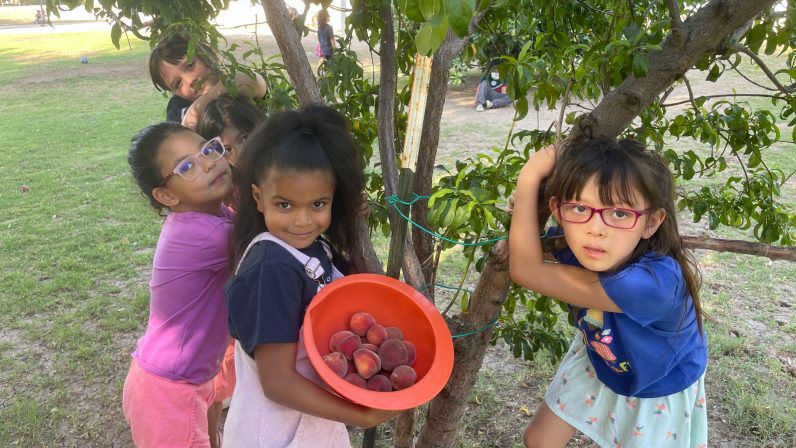On Thursday morning a group of students ran up to me excitedly asking to pick peaches. I noticed most of the peaches had already been picked, but said we could go check it out. When it was determined there were enough still left, a small envoy walked to the kitchen with me to obtain a bowl. We scoured the tree, looking for remaining peaches that the birds hadn’t discovered. After we emptied the branches of the last few fuzzy gems, they noticed one lone peach high up in the branches. Someone said, “That one’s even too high for Bryce to reach.” We decided to leave it for the birds to enjoy. Before they wandered off, I said, “You all better give this tree a big hug and say thanks for giving us so many peaches.” They eagerly turned to hug the tree in gratitude.
Next to the peach tree is an apple tree in a different cycle of production. Like the peach tree a few weeks prior, its branches are hanging low to the ground, holding at least a couple hundred ripening apples. In the next few weeks, the children and staff will pick apples, eat them for a snack, and maybe turn them into apple pies. Such a generous bounty available from two trees.
It’s important for children to have these experiences, to know what nature provides, especially when we participate in the care of something that also nourishes us. It’s helpful to have these experiences when we broaden the conversation to include care of our planet. This morning as I walked I listened to an interview with marine biologist Ayana Elizabeth Johnson. Throughout the interview she poses and then addresses this question about turning around the trajectory of climate change: “What if we get this right?”
She talks about the many practices and tools we have available right now to alter the course of climate change. Ayanna emphasizes the importance of giving back, of serving our planet and its creatures. Her words help me see the connection between science and social justice. In her work as a marine biologist she says, “Thinking about people all around the world in coastal communities, who depend on the ocean for their food security, for their livelihoods, for their cultures, if we lose the health of ocean ecosystems, we lose something much, much greater than the way it’s often framed in conservation, as an issue of biodiversity, more technically.” This conversation opened up a whole new way of looking at our current climate situation, which always seems to return to social justice.
Ayanna speaks of the importance of imagination as “one of the most valuable things we can bring to the table…A failure of imagination means a failure of the spectrum of futures that are available to us.” She talks about possibility, a word we often use to describe how we work at the Seed.: “While I’m not a fan of hope as a guiding principle, because it by definition assumes that the outcome will be good, which I know is not a given, I am completely enamored with the amount of possibility that’s available to us. So that’s the word that I try to embrace when I think about what if we get it right, is how much possibility remains.”
My mind and heart resonate deeply with her approach. Essentially, it all comes back to using love as our main approach to activism. She expresses this at the end of the interview as she reads a poem by a young Pakistani activist, Ayisha Siddiqa.
Here are the final words of her poem:
“Love is still the only revenge.
It grows each time the earth is set on fire.
But for what it’s worth, I’d do this again.
Gamble on humanity one hundred times over
Commit to life unto life, as the trees fall and take us with them.
I’d follow love into extinction.”
In the days ahead I’ll hold on to her words as I continue my work in education and social justice. And I’ll keep encouraging our teachers and students to develop their imaginations. That should be easy enough, since it’s one of our specialties here in our Seed world of possibility.

